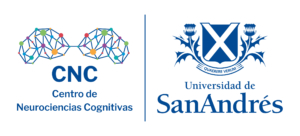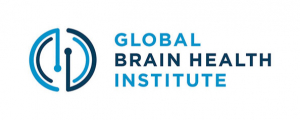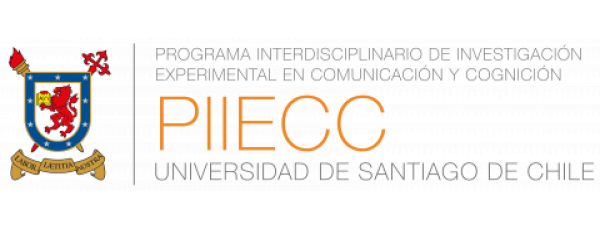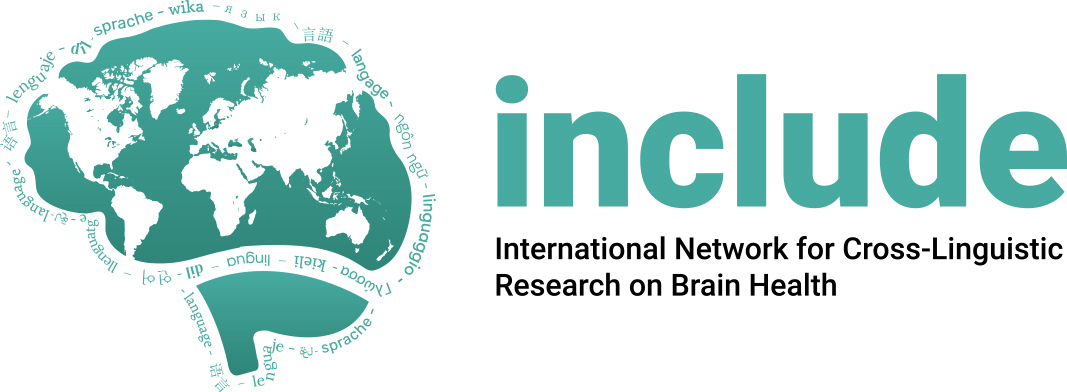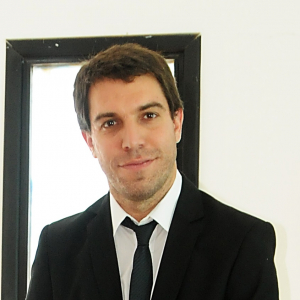
El Dr. Adolfo García se especializa en neurociencias del lenguaje. Es Director del Centro de Neurociencias Cognitivas de la Universidad de San Andrés, Senior Atlantic Fellow del Global Brain Health Institute (Universidad de California, San Francisco), e Investigador Asociado de la Universidad de Santiago de Chile, También es co-fundador de Include, una red global de investigación croslingüística en salud cerebral; y creador de TELL, una app de evaluación del lenguaje. Ha obtenido financiamiento de múltiples agencias internacionales, incluido un subsidio de USD 8,3 millones de los National Institutes of Health sobre marcadores lingüísticos de demencia. Su producción incluye más de 200 publicaciones y 250 presentaciones académicas. Sus actividades de comunicación científica incluyen una charla TEDx para una audiencia de 12.000 personas, las series audiovisuales “De cerebros y palabras” y “Lenguaje, cerebro y cuerpo”, la columna radial “Mente y comunicación” y el documental “Impulso sonoro” (Canal Encuentro). Su labor ha sido premiada por la Linguistic Association of Canada and the United States, la Asociación Argentina de Ciencias del Comportamiento, la Legislatura de la Ciudad Autónoma de Buenos Aires, la Alzheimer’s Association y los premios Ig Nobel de Harvard.
Ver biodata completa
El Dr. Adolfo García se especializa en neurociencias del lenguaje. Luego de recibirse de Traductor Técnico-Científico en Lengua Inglesa (MdPCC) y Profesor de Inglés (UNMdP), con los promedios más altos de su promoción, obtuvo su Doctorado en Letras (UNCuyo) con apoyo de una beca del CONICET. En su tesis, acreedora de una Mención de Honor, formuló el primer modelo neurocognitivo de los sistemas de reformulación interlingüística en bilingües. Luego, extendió su formación científica como Becario Posdoctoral del CONICET en el Instituto de Neurología Cognitiva (INECO). Además, realizó estancias de formación e investigación sobre neurolingüística en la Universidad de Nueva York y en la Universidad Rice (Estados Unidos).
En la actualidad, es Director del Centro de Neurociencias Cognitivas de la Universidad de San Andrés (Argentina), Senior Atlantic Fellow del Global Brain Health Institute (University of California, San Francisco), Investigador Asociado de la Universidad de Santiago de Chile, miembro honorario del Centro de Neurociencia Cognitiva de la Universidad de La Laguna (España), y Talento de Alto Nivel del Ministerio de Ciencia y Tecnología de China. También es co-fundador de Include, una red global de investigación croslingüística en salud cerebral; y creador de la app Toolkit to Examine Lifelike Language (TELL). Anteriormente, se desempeñó como Profesor de Introducción a la Traductología en la Universidad Nacional de Córdoba (2011-2014), Profesor de Neurolingüística en la UNCuyo (2014-2022), Director Científico del Laboratorio de Psicología Experimental y Neurociencias en el Instituto de Neurociencia Cognitiva y Traslacional (2016-2020), Investigador del CONICET (2016-2022), Director de la Maestría en Lenguaje y Cognición de la UNCuyo (2019-2022), Director de Ciencias del Lenguaje de Redenlab (2021-2022) y Presidente de la Red Internacional de Traductología Cognitiva TREC (2019-2023).
En 2023, junto con Maria Luisa Gorno-Tempini y Agustín Ibáñez, se adjudicó un proyecto R01 de los NIH por USD 8,3 millones para realizar la mayor investigación de lenguaje en demencia a lo largo de Latinoamérica y los Estados Unidos. Además, ha encabezado proyectos financiados por el Ministerio de Ciencia, Tecnología e Innovación de Argentina (2023), Fondo de Ciencias de la Vida SF500 de Argentina (2022), el Instituto BrainLat de Chile (2022), la Alzheimer’s Association (2021), la Agencia Nacional de Investigación y Desarrollo de Chile (2021), el British Council (2019), la Asociación Lingüística de Canadá y los Estados Unidos (2014), la Asociación Australiana de Lingüística Sistémico-Funcional (2014), la Asociación de Universidades Grupo Montevideo (2012) y la Secretaría de Políticas Universitarias del Ministerio de Educación (2009). También ha sido coinvestigador en proyectos de la Network of European Institutes for Advanced Study (2022), el Centro Latinoamericano-Suizo de la Universidad de San Gallen (2019), el Fondo General de Investigación de Hong Kong (2019), la Agencia Nacional de Promoción Científica y Tecnológica de Argentina (2018), el Banco Interamericano de Desarrollo (2018), el Ministerio de Economía y Competitividad de España (2016) y el programa COLCIENCIAS de Colombia (2016).
Cuenta con más de 200 publicaciones, entre las que se incluyen artículos en Brain, Alzheimer’s & Dementia, Neurology, Movement Disorders, Nature Human Behavior, Neuroscience and Biobehavioral Reviews, npj Parkinson’s Disease, Cerebral Cortex, Philosophical Transactions of the Royal Society, NeuroImage, Scientific Reports, Journal of Medical Genetics, Cortex, Cognition, Brain and Language y Journal of the International Neuropsychological Society. Entre sus libros se destacan The Routledge Handbook of Semiosis and the Brain (Routledge, 2022), The Neurocognition of Translation and Interpreting (John Benjamins, 2019), Contextual Cognition (Springer, 2018), An Introduction to Relational Network Theory (Equinox, 2017, prologado por Michael Halliday), Mente bilingüe (Comunicarte, 2016) y Qué son las neurociencias (Paidós, 2015). También ha editado números especiales para Cortex, Frontiers in Aging Neuroscience y Perspectives: Studies in Translation Theory and Practice. Asimismo, publicó un libro de relatos, titulado Incierta forma (Babel, 2012).
Como parte de su producción, ha formulado el modelo Hand-Action-Network Dynamic Language Embodiment (HANDLE), propuesta teórica que da cuenta de la sinergia neurocognitiva entre el procesamiento lingüístico y la realización de movimientos manuales. También ha propuesto la llamada Disrupted Motor Grounding Hypothesis, en tanto marco general para caracterizar diversos déficits lingüísticos en trastornos del movimiento. En la actualidad, estas formulaciones se están empleando como base explicativa de múltiples formas de interacción entre dominios cognitivos en abordajes corporizados y situados de la cognición normal y patológica. Asimismo, ha consolidado una visión general de los principales sistemas neurocognitivos implicados en la traducción mediante el Modelo Neuroarquitectónico Traductor.
Adolfo, además, ha realizado más de 250 presentaciones académicas. Asimismo, ha organizado diversos eventos científicos de alcance mundial, incluyendo la primera edición del ciclo internacional de conferencias “Traducción, interpretación y cognición”. Su trayectoria también incluye cargos editoriales en las revistas Journal of Alzheimer’s Disease, Frontiers in Human Neuroscience, Frontiers in Aging Neuroscience, Aging Brain, Perspectives: Studies in Translation Theory and Practice y Journal of World Languages. Además, colabora como evaluador para diversas agencias de investigación y numerosas revistas líderes sobre neurociencias, neurolingüística y neurología comportamental.
Adolfo tiene una intensa agenda de comunicación científica. Entre estas actividades se destacan una charla TEDx para una audiencia de 12.000 personas, las series audiovisuales “De cerebros y palabras” y “Lenguaje, cerebro y cuerpo”, la columna radial “Mente y comunicación”, el documental “Impulso sonoro” (Canal Encuentro), la muestra interactiva Cerebreando (en Tecnópolis) y apariciones en medios como Scientific American, BBC, Nature News, Discovery Channel, Popular Science, Daily Mail, Newsweek y Le Monde.
En el plano docente, ha dictado cursos de grado, posgrado y formación profesional en Argentina, Chile, Colombia, Estados Unidos, Alemania y China. También ha sido Profesor Visitante de la Universidad Macquarie (Australia), la Universidad del Valle (Colombia), la Universidad de Antioquia (Colombia), la Pontificia Universidad Católica de Valparaíso (Chile), la Universidad Johannes Gutenberg (Alemania), la Universidad de Durham (Reino Unido), la Universidad de Macao (China) y la Universidad de Ciencia Electrónica y Tecnología de China. Asimismo, ha supervisado a numerosos tesistas de doctorado, maestría y grado en Argentina y en el exterior.
En 2013, se adjudicó el Most Outstanding Paper Award por parte de la Asociación Lingüística de Canadá y los Estados Unidos. En 2015, recibió el Premio Investigador Joven, de la Asociación Argentina de Ciencias del Comportamiento, y una distinción de la Honorable Cámara de Diputados de la Provincia de Mendoza por su labor como divulgador de neurociencias. En 2017, fue reconocido como Personalidad Destacada en el ámbito de la ciencia por la Municipalidad del Partido de Balcarce y recibió un galardón en el Primer Concurso de Investigación en Patologías Neurodegenerativas MTC, organizado por la Asociación de Ataxias de Argentina y la Fundación HD Lorena Scarafiocca. Ese mismo año, su labor sobre el rol del lenguaje como marcador temprano en enfermedad de Parkinson fue destacada como uno de los 10 principales avances científicos de la Argentina. En 2018, sus logros en este campo obtuvieron un reconocimiento de la Legislatura de la Ciudad Autónoma de Buenos Aires. En 2021, su trabajo fue premiado por la Alzheimer’s Association. En 2023, integró el equipo ganador del premio Ig Nobel en la categoría Comunicación.
Adolfo García, Ph.D., specializes in the neuroscience of language. He serves as Director of the Cognitive Neuroscience Center (Universidad de San Andrés, Argentina), Senior Atlantic Fellow at the Global Brain Health Institute (University of California, San Francisco), and Associate Researcher at Universidad de Santiago de Chile. He is also co-founder of Include, a global network for crosslinguistic research on brain health; and creator of TELL, a speech testing app. He has obtained funds from multiple international agencies, including a USD 8.3 million grant from the National Institutes of Health on linguistic markers of dementia. He has authored more than 200 publications and offered 250 presentations. His science communication milestones include a TEDx talk with a live audience of 12,000 persons, the TV show “Of brains and words,” the video series “Language, brain, and body,” the radio column “Mind and communication,” and the documentary “Impulso sonoro” (Canal Encuentro). His contributions have been recognized by the Linguistic Association of Canada and the United States, the Argentine Association of Behavioral Science, the Legislature of the City of Buenos Aires, the Alzheimer’s Association, and Harvard’s Ig Nobel awards.
See full biodata
Dr. Adolfo García specializes in the neuroscience of language and communication. Having graduated with honors as Technical-Scientific Translator (MdPCC, Argentina) and Teacher of English (UNMdP, Argentina), he obtained his Ph.D. in Language Science (UNCuyo, Argentina), with funding from CONICET. His award-winning thesis postulated a neurocognitive model of translation in bilinguals. Then, with the support of a Postdoctoral Fellowship from CONICET, he extended his scientific education at the Institute of Cognitive Neurology (INECO). His research training on neurolinguistics also included stays at New York University and Rice University (USA).
Currently, he serves as Director of the Cognitive Neuroscience Center at Universidad de San Andrés (Argentina), Senior Atlantic Fellow at the Global Brain Health Institute (University of California, San Francisco), Associate Researcher at Universidad de Santiago de Chile, honorary member of the Center of Cognitive Neuroscience at La Laguna University (Spain), and High-Level Talent of the Ministry of Science and Technology of China. He is also co-founder of Include, a global network for crosslinguistic research on brain health; and creator of the Toolkit to Examine Lifelike Language (TELL) app. He has previously served as Professor of Introduction to Translation Studies at the National University of Córdoba (2011-2014); Professor of Neurolinguistics at UNCuyo (2014-2022); Scientific Director of the Laboratory of Experimental Psychology and Neuroscience at the Institute of Cognitive and Translational Neuroscience (2016-2020); Researcher at CONICET (2016-2022); Director of the Master in Language and Cognition at UNCuyo (2019-2022); Director of Language Sciences at Redenlab (2021-2022); and President of TREC, the largest global network on cognitive translation studies (2019-2023).
In 2023, together with Maria Luisa Gorno-Tempini and Agustín Ibáñez, he obtained an USD 8.3 million NIH-R01 grant to conduct the largest investigation of language changes in dementia across Latin America and the US. He has led projects funded by the Argentine Ministry of Science, Technology, and Innovation (2023), the SF500 Life Sciences Fund (2022), the BrainLat Institute (2022), the Alzheimer’s Association (2021), the National Research and Development Agency of Chile (2021), the British Council (2019), the Linguistic Association of Canada and the United States (2014), the Australian Association of Systemic-Functional Linguistics (2014), the Association of Universities Montevideo Group (2012), and the Secretariat of University Policies of the Ministry of Education (2009). He has also served as co-investigator in projects of the Network of European Institutes for Advanced Study (2022), the Latin American-Swiss Center of the University of St. Gallen (2019), the General Research Fund of Hong Kong (2019), the National Agency for Scientific and Technological Promotion of Argentina (2018), the Inter-American Development Bank (2018), the Ministry of Economy and Competitiveness of Spain (2016), and the COLCIENCIAS program of Colombia (2016).
He has authored more than 200 publications, including articles in Brain, Alzheimer’s & Dementia, Neurology, Movement Disorders, Nature Human Behavior, Neuroscience and Biobehavioral Reviews, npj Parkinson’s Disease, Cerebral Cortex, Philosophical Transactions of the Royal Society, NeuroImage, Scientific Reports, Cortex, Journal of Medical Genetics, Cognition, Brain and Language, and Journal of the International Neuropsychological Society. His books include The Routledge Handbook of Semiosis and the Brain (Routledge, 2022), The Neurocognition of Translation and Interpreting (John Benjamins, 2019), Contextual Cognition (Springer, 2018), An Introduction to Relational Network Theory (Equinox, 2017, foreword by Michael Halliday), Mente bilingüe (Comunicarte, 2016), and Qué son las neurociencias (Paidós, 2015). He has also edited special issues for Cortex, Frontiers in Aging Neuroscience, and Perspectives: Studies in Translation Theory and Practice. Moreover, he published a collection of short stories titled Incierta forma (Babel, 2012).
He has formulated the Hand-Action-Network Dynamic Language Embodiment (HANDLE) model, an account of neurocognitive synergies during joint processing of language and manual movements. He has also advanced the Disrupted Motor Grounding Hypothesis, which provides a rationale for several linguistic deficits in neurodegenerative movement disorders. These formulations are now being applied to explain several forms of cross-domain interaction in embodied and situated approaches to healthy and pathological cognition. Moreover, he has consolidated a neurocognitive model of translation in bilinguals.
Adolfo has also offered over 250 presentations. Furthermore, he has organized worldwide scientific events, including the first edition of the international conference series “Translation, Interpretation and Cognition.” His career also includes editorial positions in the Journal of Alzheimer’s Disease, Frontiers in Human Neuroscience, Frontiers in Aging Neuroscience, Aging Brain, Perspectives: Studies in Translation Theory and Practice, and the Journal of World Languages. In addition, he collaborates as a reviewer for several research agencies and numerous leading journals in neuroscience, neurolinguistics, and behavioral neurology.
Adolfo has an intense scientific communication agenda. Highlights of these activities include a TEDx talk with a live audience of 12,000 persons, the TV show “Of brains and words,” the video series “Language, brain, and body,” the radio column “Mind and communication,” the documentary “Impulso sonoro” (Canal Encuentro), the interactive exhibition Cerebreando exhibition (in Tecnópolis) and appearances in media such as Scientific American, BBC, Nature News, Discovery Channel, Popular Science, Daily Mail, Newsweek, and Le Monde.
As a professor, he has taught undergraduate, graduate, and professional development courses in Argentina, Chile, Colombia, USA, Germany, and China. He has also been a Visiting Professor at Macquarie University (Australia), Universidad del Valle (Colombia), Universidad de Antioquia (Colombia), Pontificia Universidad Católica de Valparaíso (Chile), Johannes Gutenberg University (Germany), Durham University (UK), Macau University (China), and the University of Electronic Science and Technology of China. Furthermore, he has supervised numerous research fellows and undergraduate, masters, and Ph.D. students in Argentina and Europe.
In 2013 he received the Most Outstanding Paper Award from the Linguistic Association of Canada and the United States. In 2015, he was awarded the Young Investigator Prize, granted by the Argentine Association of Behavioral Science, and a distinction by the House of Representatives of Mendoza (Argentina) for his contributions to the public dissemination of neuroscience. In 2017, he was proclaimed Distinguished Citizen of Balcarce in the field of science, and he obtained an award at the MTC 2017 Neurodegenerative Disease Research Contest, hosted by the Argentina Ataxia Association and the Lorena Scarafiocca Foundation for Huntington’s disease. That same year, his work on language as an early marker of Parkinson’s diseases was chosen among the top-10 scientific breakthroughs in Argentina. In 2018, his achievements in this field earned him a recognition from the Legislature of the City of Buenos Aires. In 2021, he received a Best Presentation Award from the Alzheimer’s Association. In 2023, he was part of the team that won the Ig Nobel award in the Communication category.

